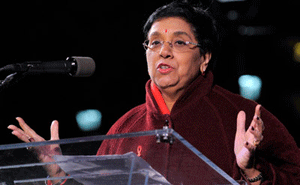Statement
Calling for Universal Access and Human Rights
01 December 2010
Statement
01 December 2010
Today, on World AIDS Day, UNFPA and the UNAIDS family as a whole extends solidarity to all people who are living with HIV and AIDS and their loved ones, and we remember and pay tribute to those who have lost their lives to AIDS.
UNFPA also joins the UNAIDS family in calling for universal access to HIV prevention, treatment, care and support, and respect for human rights for all on this World AIDS Day.
 |
|
DED Purnima Mane speaking at World AIDS Day commemoration in Washington Square Park, New York, on 1 December 2010. |
At this event, Light for Rights, the lights are turned off to symbolize how stigma, discrimination and criminalization force people into darkness, to deal with HIV in isolation and without support.
The light of “human rights and equality” allows people living with HIV to access information, treatment and care, enabling them to live the healthy, free productive lives they fully deserve.
UNAIDS, the Joint United Nations Programme on HIV and AIDS, has a vision of a world with zero discrimination, zero new HIV infections and zero AIDS-related deaths.
By working together, with governments, civil society, international organizations and the private sector, we can make this vision a reality.
Today, we continue our work in the spirit of optimism; just last week UNAIDS announced the long-awaited news that the global HIV epidemic has been halted and its course is being reversed.
New HIV infections have fallen by nearly 20% in the last 10 years, AIDS-related deaths are down by nearly 20% in the last 5 years, and the total number of people living with HIV is stabilizing.
More than 5 million people living with HIV worldwide are receiving antiretroviral therapy. And, more and more mothers are saved from dying and babies protected from becoming infected with HIV.
We applaud the leadership of young people, who have adopted safer sexual practices and are now leading the prevention revolution. Among young people in 15 of the most severely affected countries, the rate of new HIV infections has fallen by more than 25 per cent.
Yet, all these gains are fragile and much work needs to be done to achieve our dream of an AIDS-free generation. We must continue to revolutionize prevention, further catalyze treatment, care and support, and make human rights and gender equality central to the response.
In order to truly achieve universal access, access for every single person—including men who have sex with men, sex workers, injecting drug users, transgender persons, refugees, migrants, and all those who are vulnerable and most at risk—we must protect human rights and remove punitive laws, policies and practices, and eliminate stigma and discrimination.
Nearly 30 years into the epidemic, there are still many countries with negative laws that undermine the HIV response, but there are also positive examples where laws have had a positive impact—such as protecting the right to treatment, and the right to be free from HIV-related discrimination in all spheres of life, including the workplace, in schools and in military service. We also see positive examples where laws have guaranteed women equal inheritance and property rights thereby reducing the impact of HIV on women, children, families and communities.
We must therefore continue to support universal human rights as part of our call for universal access to prevention, treatment, care and support.
Together, we must continue to share, care and dare to do the right thing to advance justice, equity, and dignity for all.
Today, on World AIDS Day, and every day, we call for universal access and human rights for all so that we can achieve our vision of zero discrimination, zero new HIV infections and zero AIDS-related deaths.
This is the future we want to create, this is the dream we must pursue together.
Thank you very much.